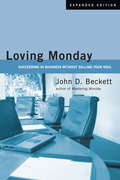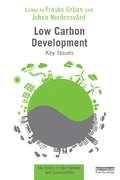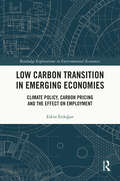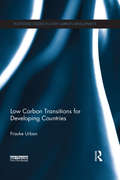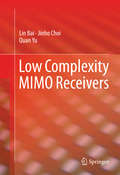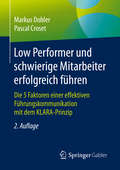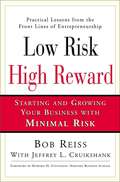- Table View
- List View
Love's Enlightenment: Rethinking Charity in Modernity
by Ryan Patrick HanleyA number of prominent moral philosophers and political theorists have recently called for a recovery of love. But what do we mean when we speak of love today? Love's Enlightenment examines four key conceptions of other-directedness that transformed the meaning of love and helped to shape the way we understand love today: Hume's theory of humanity, Rousseau's theory of pity, Smith's theory of sympathy, and Kant's theory of love. It argues that these four Enlightenment theories are united by a shared effort to develop a moral psychology that can provide both justificatory and motivational grounds for concern for others in the absence of recourse to theological or transcendental categories. In this sense, each theory represents an effort to redefine the love of others that used to be known as caritas or agape - a redefinition that came with benefits and costs that have yet to be fully appreciated.
Love, Lashes, and Lipstick
by Mally RoncalFrom A-list celebrity makeup artist and Mally Beauty founder Mally Roncal comes an inspirational guide to living a gorgeous life inside and out, with step-by-step beauty lessons and personal stories about how inner strength, a positive outlook, and plenty of mascara can empower and uplift women at every age. Celebrity makeup artist Mally Roncal has a message she wants to share with the whole world: What makes you different makes you beautiful! It's the mantra that inspires her work with A-list clients (who include Jennifer Lopez, Mariah Carey, Beyoncé, Angelina Jolie, Taylor Swift, Mary J. Blige, and Kelly Osbourne) and every single "bulletproof" item in her Mally Beauty cosmetics line. With her warm, generous spirit, infectious energy, and deeply rooted belief that with a positive outlook and a couple of genius makeup tricks every woman can be gorgois inside and out, Mally has created a legion of fans, a.k.a. Mallynistas, who faithfully tune in whenever she appears on QVC and follow her on Facebook, YouTube, Twitter, and Instagram. In Love, Lashes, and Lipstick, Mally tells her own story of growing up as the daughter of two Filipino doctors; smuggling blue eyeliner into her Catholic school; breaking into the business (with giant platform heels and bleached blond hair) in New York; jetting around the world with megastars; meeting her soul mate when she was least expecting it; and gradually building a full, joyous life running her own business and raising three young girls. Along with her wise and hilarious life lessons, Mally shares the secrets to all her signature looks with easy, step-by-step instructions and gorgeous illustrations. Want to master Beyoncé's and JLo's sexy glow, or the ultimate smoky eye? Need to look polished but fierce for a big day at work, or fake eight hours of sleep when you only got four? As Mally would say, "It's all here, my loves! Come and get it!"Advance praise for Love, Lashes, and Lipstick "The most important thing we learn from Mally (aside from everything you ever wanted to know about false eyelashes) is how to have fun, how to be a wonderful, beautiful, love-filled person, and how to enjoy life. Had this book come along earlier, I might have had a better life (and better lashes)."--Isaac Mizrahi "Mally Roncal's approach to makeup is exemplified by her personality: smart, sexy, fun, and beautiful. I really dig this woman!"--RuPaul "Mally's gift, aside from creating beautiful makeup, is her incredible generosity of spirit. She shares tools for feeling beautiful inside and out. Mally's family is the center of her universe, and her heart is big enough to enfold each and every friend, client, and customer within that family. Kudos to my dear friend on this amazing book! Within it are the tools for achieving true beauty."--Tracy Reese "Mally isn't just a beauty expert--she's a spirited cheerleader for women everywhere. Within the first twenty minutes of reading her new book, I found myself in stitches, then tears, then stitches again. Part memoir, part beauty how-to, this hilariously informative tome is a must-read for anyone (and everyone) who doesn't see girl power and beauty as mutually exclusive."--Amy Synnott, executive editor, InStyle"A lot of makeup artists can show you how to look better, but Mally is the rare luminary who actually makes you feel better, too. Her passion for bringing happiness and beauty to all women is as endless as her talent."--Victoria Kirby, beauty director, RedbookFrom the Hardcover edition.
Love, Money, and Parenting: How Economics Explains the Way We Raise Our Kids
by Matthias Doepke Fabrizio ZilibottiAn international and historical look at how parenting choices change in the face of economic inequalityParents everywhere want their children to be happy and do well. Yet how parents seek to achieve this ambition varies enormously. For instance, American and Chinese parents are increasingly authoritative and authoritarian, whereas Scandinavian parents tend to be more permissive. Why? Love, Money, and Parenting investigates how economic forces and growing inequality shape how parents raise their children. From medieval times to the present, and from the United States, the United Kingdom, Germany, Italy, Spain, and Sweden to China and Japan, Matthias Doepke and Fabrizio Zilibotti look at how economic incentives and constraints—such as money, knowledge, and time—influence parenting practices and what is considered good parenting in different countries.Through personal anecdotes and original research, Doepke and Zilibotti show that in countries with increasing economic inequality, such as the United States, parents push harder to ensure their children have a path to security and success. Economics has transformed the hands-off parenting of the 1960s and ’70s into a frantic, overscheduled activity. Growing inequality has also resulted in an increasing “parenting gap” between richer and poorer families, raising the disturbing prospect of diminished social mobility and fewer opportunities for children from disadvantaged backgrounds. In nations with less economic inequality, such as Sweden, the stakes are less high, and social mobility is not under threat. Doepke and Zilibotti discuss how investments in early childhood development and the design of education systems factor into the parenting equation, and how economics can help shape policies that will contribute to the ideal of equal opportunity for all.Love, Money, and Parenting presents an engrossing look at the economics of the family in the modern world.
LoveWork: The seven steps to thrive at work
by Ben Renshaw Sophie Devonshire"LoveWork offers a step-by-step framework for doing the work you love and loving the work you do. It is filled with illustrative scenario-based examples to nurture the free expression of ideas and help you thrive." From the foreword by Amy C. Edmondson, Novartis Professor of Leadership and Management Harvard Business SchoolLife provides a unique opportunity to do great things and help make the world a better place. Given that a staggering 90,000 hours of our lives (on average) will be spent working, how many of those precious hours will be meaningful or memorable?Authors Ben Renshaw and Sophie Devonshire believe it's possible to make the time you spend at work more rewarding and enjoyable. In LoveWork they share seven simple steps to help you find new ways to build a more positive relationship with your work.This book is for you if:· You are moving up through your work or moving on to a new role· You'd like to move faster or go further· You want to find, rediscover or nurture your love of work.You'll learn how to unlock your thinking to trigger a renaissance in your work experience, to embrace dynamic working and to discover, develop and then deliver new ways to thrive at work. If you want to love life, you'll need to LoveWork. It's time to stop counting the hours and start making those hours count.-------------------------------------"Follow the LoveWork code to unlock your potential and exceed expectations at work." John Holland-Kaye, Chief Executive Officer Heathrow"Don't chase a title, or the money. Chase the work you love and let LoveWork show you how." Keith Barr, Chief Executive Officer, InterContinental Hotels Group"If you dread Mondays, if work is a chore, YOU MUST READ THIS BOOK. It doesn't have to be like that. Indeed, it shouldn't. The case studies alone are incredibly helpful...so many stories of people who have turned it around - and you can too. And if you're a business leader, use LoveWork to create an organisation where people are happy and fulfilled." Greg Jackson, CEO Octopus Energy"Loving your work provides fulfilment and meaning. Taking the steps in LoveWork will drive you in the right direction." Angela Brav, President, Hertz Internationa
LoveWork: The seven steps to thrive at work
by Ben Renshaw Sophie Devonshire"LoveWork offers a step-by-step framework for doing the work you love and loving the work you do. It is filled with illustrative scenario-based examples to nurture the free expression of ideas and help you thrive." From the foreword by Amy C. Edmondson, Novartis Professor of Leadership and Management Harvard Business SchoolLife provides a unique opportunity to do great things and help make the world a better place. Given that a staggering 90,000 hours of our lives (on average) will be spent working, how many of those precious hours will be meaningful or memorable?Authors Ben Renshaw and Sophie Devonshire believe it's possible to make the time you spend at work more rewarding and enjoyable. In LoveWork they share seven simple steps to help you find new ways to build a more positive relationship with your work.This book is for you if:· You are moving up through your work or moving on to a new role· You'd like to move faster or go further· You want to find, rediscover or nurture your love of work.You'll learn how to unlock your thinking to trigger a renaissance in your work experience, to embrace dynamic working and to discover, develop and then deliver new ways to thrive at work. If you want to love life, you'll need to LoveWork. It's time to stop counting the hours and start making those hours count.-------------------------------------"Follow the LoveWork code to unlock your potential and exceed expectations at work." John Holland-Kaye, Chief Executive Officer Heathrow"Don't chase a title, or the money. Chase the work you love and let LoveWork show you how." Keith Barr, Chief Executive Officer, InterContinental Hotels Group"If you dread Mondays, if work is a chore, YOU MUST READ THIS BOOK. It doesn't have to be like that. Indeed, it shouldn't. The case studies alone are incredibly helpful...so many stories of people who have turned it around - and you can too. And if you're a business leader, use LoveWork to create an organisation where people are happy and fulfilled." Greg Jackson, CEO Octopus Energy"Loving your work provides fulfilment and meaning. Taking the steps in LoveWork will drive you in the right direction." Angela Brav, President, Hertz Internationa
LoveWork: The seven steps to thrive at work
by Ben Renshaw Sophie DevonshireSeven steps to transforming your life by making work better.Life provides a unique opportunity to do great things and help make the world a better place. Given that a staggering 90,000 hours of our lives (on average) will be spent working, how many of those precious hours will be meaningful or memorable?Authors Ben Renshaw and Sophie Devonshire believe it's possible to make the time you spend at work more rewarding and enjoyable. In LoveWork they share seven simple steps to help you find new ways to build a more positive relationship with your work.This audiobook is for you if:· You are moving up through your work or moving on to a new role· You'd like to move faster or go further· You want to find, rediscover or nurture your love of work.You'll learn how to unlock your thinking to trigger a renaissance in your work experience, to embrace dynamic working and to discover, develop and then deliver new ways to thrive at work. If you want to love life, you'll need to LoveWork. It's time to stop counting the hours and start making those hours count.-------------------------------------"Follow the LoveWork code to unlock your potential and exceed expectations at work." John Holland-Kaye, Chief Executive Officer Heathrow"Don't chase a title, or the money. Chase the work you love and let LoveWork show you how." Keith Barr, Chief Executive Officer, InterContinental Hotels Group"Loving your work provides fulfilment and meaning. Taking the steps in LoveWork will drive you in the right direction." Angela Brav, President, Hertz Internationa(P) 2021 Hodder & Stoughton Limited
Loved: How to Rethink Marketing for Tech Products (Silicon Valley Product Group)
by Martina LauchengcoMost tech companies get marketing wrong because they don't know how to do product marketing right. The next in the bestselling SVPG series, LOVED shows what leaders like Apple, Netflix, Microsoft, and Salesforce do well and how to apply it to transform product marketing at your company. The best products can still lose in the marketplace. Why? They are beaten by products with stronger product marketing. Good product marketing is the difference between “also-ran” products versus products that lead. And yet, product marketing is widely misunderstood. Although it includes segmenting customers, positioning your product, creating product collateral, and supporting sales teams, great product marketing achieves much more. It directs the best way to bring your product to market. It shapes what the world thinks about your product and category. It inspires others to tell your product’s story. Part of the bestselling series including INSPIRED and EMPOWERED, LOVED explains the fundamentals of best-in-class product marketing for product teams, marketers, founders and any leader with a product and a vision. Sharing her personal stories as a former product and marketing leader at Microsoft and Netscape, and as an advisor to Silicon Valley startups, venture capitalist, and UC Berkeley engineering graduate school lecturer, Martina Lauchengco distills decades of lessons gleaned from working with hundreds of companies to make LOVED the definitive guide to modern product marketing. With dozens of stories from the trenches of market leaders as well as newer startups with products just beginning their journey, the book shows you: the centrality of product marketing to any product’s success the key skills and actions required to do it well the four fundamentals of product marketing and how to apply them how to hire, lead, and organize product marketing how product marketers optimize crucial collaboration with other functions one-sheet frameworks, tools and agile marketing practices that help simplify and elevate product marketing LOVED is an invitation to rethink tired notions of product marketing and practice a more dynamic, customer and market-centric version that creates raving fans and helps products achieve their full market potential.
Loveman's: Meet Me Under the Clock (Landmark Department Stores Ser.)
by Tim HollisIn an era when local department stores still thrived, Birmingham shoppers had different stores from which to choose. But when customers sought more than bargain prices, when they demanded unparalleled quality and outright luxury, they chose Loveman's. The first store opened in Birmingham in 1887, and the chain eventually grew to include locations in Huntsville and Montgomery, embracing those from throughout the state who valued an upscale shopping experience. Weathering the Great Depression, a devastating fire that destroyed the original location in 1934 and historic civil rights protests in the early 1960s, Loveman's proved to be an enduring name through many eras of change until finally closing its doors in 1980. Now, Birmingham historian Tim Hollis chronicles the sterling history of this celebrated store's commitment to excellence.
Lovepop
by Ramana Nanda Robert White Olivia HullAs they prepare to graduate from Harvard Business School, the co-founders of greeting card company startup Lovepop need capital to cover the company’s operating costs and must choose between two seed financing offers. One offer is from an angel group and the other from a startup accelerator. Having bootstrapped the company’s operations since its founding a year and a half earlier, the founders must weigh the differences in valuation and pros and cons of the accelerator program to determine which option is appropriate for Lovepop at this stage. In addition to addressing the challenges of early stage fundraising, the case details the terms, offerings, and operations of startup accelerators.
Loving Monday: Succeeding in Business Without Selling Your Soul
by John D. BeckettInstead of grinding it out until Friday and living only for weekends, a successful Ohio manufacturing executive has seen how his work can be filled with meaning and purpose. The key is integrating his work and beliefs. As a result, both grow--along with his love for Mondays. Beckett brings all of life together: work, belief, value, character, relationship, truth, worship and joy. The result is employees who feel valued, enjoy their work, work hard and are successful at what they do. Here is a book for everyone who wants to succeed in business without selling out. Includes study guide and a new afterword.
Low Carbon Development: Key Issues (Key Issues in Environment and Sustainability)
by Frauke Urban Johan NordensvardLow Carbon Development: Key Issues is the first comprehensive textbook to address the interface between international development and climate change in a carbon constrained world. It discusses the key conceptual, empirical and policy-related issues of low carbon development and takes an international and interdisciplinary approach to the subject by drawing on insights from across the natural sciences and social sciences whilst embedding the discussion in a global context. The first part explores the concept of low carbon development and explains the need for low carbon development in a carbon constrained world. The book then discusses the key issues of socio-economic, political and technological nature for low carbon development, exploring topics such as the political economy, social justice, financing and carbon markets, and technologies and innovation for low carbon development. This is followed by key issues for low carbon development in policy and practice, which is presented based on cross-cutting issues such as low carbon energy, forestry, agriculture and transportation. Afterwards, practical case studies are discussed from low carbon development in low income countries in Africa, middle income countries in Asia and Latin America and high income countries in Europe and North America. Written by an international team of leading academics and practitioners in the field of low carbon development, this book is essential reading for students, academics, professionals and policy-makers interested in the fields of low carbon development, climate change mitigation, climate policy, climate change and development, global environmental change, and environment and development.
Low Carbon Energy Supply: Trends, Technology, Management (Green Energy and Technology)
by Atul Sharma Amritanshu Shukla Lu AyeThis book focuses on recent trends in the areas of green and renewable energy, especially as applied to the carbon footprint of energy production, transmission, and use. Discussing the latest developments and advances in the materials and processes involved in energy generation, transmission, distribution and storage, with a particular focus on the management and policies related to these systems, it is a valuable resource for researchers, practitioners, and policy makers working in these areas.
Low Carbon Energy in the Middle East and North Africa (International Political Economy Series)
by Li-Chen Sim Robin MillsThis book explores the evolving roles of energy stakeholders and geopolitical considerations, leveraging on the dizzying array of planned and actual projects for solar, wind, hydropower, waste-to-energy, and nuclear power in the region. Over the next few decades, favorable economics for low carbon energy sources combined with stagnant oil demand growth will facilitate a shift away from today’s fossil fuel-based energy system. Will the countries of the Middle East and North Africa be losers or leaders in this energy transition? Will state–society relations undergo a change as a result? It suggests that ultimately, politics more so than economics or environmental pressure will determine the speed, scope, and effects of low carbon energy uptake in the region. This book is of interest to academics working in the fields of International Relations, International Political Economy, Comparative Political Economy, Energy Economics, and International Business. Consultants, practitioners, policy-makers, and risk analysts will also find the insights helpful.
Low Carbon Pathways for Growth in India (India Studies in Business and Economics)
by Rajat Kathuria Saon Ray Kuntala BandyopadhyayThis book explores ways in which India can negotiate the low carbon path up until 2030, when it is expected to be the largest economy after the US and China. It comprehensively reviews the low climate pathways for India and provides a guide to the pathways that the country can adopt. India’s population, energy demands and emissions will increase significantly, and the challenge is to restrict its CO2 emissions and walk the low carbon path. Through its Intended Nationally Determined Contributions (INDCs), India has pledged to reduce its emissions significantly.Addressing the question of which low carbon paths India can adhere to without compromising its growth, the book identifies the key factors that feed into existing models of climate change and discusses the cost of action versus inaction. It also examines key issues concerning India’s environment through the lens of the transport, industry and water sectors. The book concludes by looking at policy implications for low carbon growth in India.
Low Carbon Politics: A Cultural Approach Focusing on Low Carbon Electricity (Routledge Studies in Energy Policy)
by David TokeLow Carbon Politics focuses on how policies and institutions have influenced the deployment of renewable energy and nuclear power in the electricity sector. Cultural theory is used to analyse this. Egalitarian pressures have had a profound influence on technological outcomes, not merely in securing the deployment of renewable energy but also in increasing the costs of nuclear power. Whereas in the 1970s it might have been expected that individualist, market based pressures allied to dominant hierarchies would deliver nuclear power as the main response to problems associated with fossil fuels, a surprising combination has emerged. Egalitarian and individualist pressures are, together, leading to increasing levels of deployment of renewable energy. This work finds that electricity monopolies tend to favour nuclear power whereas competitive arrangements are more likely to lead to more renewable energy being deployed. It covers developments in a number of countries including USA, UK, China, South Africa and also Germany and Denmark. This book will be of great relevance to students, academics and policymakers with an interest in energy policy, low carbon politics and climate change.
Low Carbon Transition in Emerging Economies: Climate Policy, Carbon Pricing and the Effect on Employment (Routledge Explorations in Environmental Economics)
by Erkin ErdoğanMany emerging economies are in the front line of the devastating impacts of global warming such as desertification and extreme weather events but, for historical and political reasons, they follow ambitious growth targets with seemingly little concern for climate change and environmental degradation. Focusing on the case of Turkey, this book investigates the economic impacts of possible climate change policies to help meet the required mitigation targets and transition to a low carbon economy. In order to reach the net-zero targets by 2050 in compliance with the Paris Agreement, Turkey must introduce policies that promote low carbon investments, green jobs and low carbon employment more broadly. This book explores the empirical evidence on the effectiveness of a carbon pricing mechanism by developing an econometric VAR model to analyse key data sets. This time series analysis provides insights on a macro level, dealing with aggregate data in which the role and complexity of micro interferences disappears, allowing for the discovery of patterns and changes over time. Thus, the book contributes to the literature on methodology by arguing that time series analysis is one of the best fitting approaches to estimate possible impacts of climate change policies in an economy. Additionally, the results of the model are compared and contrasted with similar data from other emerging economies to identify potential common policy solutions between countries at a similar stage of development. This book is vital reading for researchers interested in climate policy, the economics of climate change and environmental economics.
Low Carbon Transitions for Developing Countries (Routledge Studies in Low Carbon Development)
by Frauke UrbanGlobal climate change is one of the greatest challenges of our times and in order to tackle this carbon emissions need to be mitigated. China and India have recently become some of the world’s largest greenhouse gas emitters. Transitions to low carbon energy, for reducing emissions that lead to climate change, are therefore an urgent priority for China and India and at a global level. This is the first book focusing on low carbon energy transitions for emerging economies such as China and India, assessing the opportunities and barriers for transitions to renewable and low carbon energy as climate change mitigation options. It uses energy modelling to assess the China’s power sector, the economy of Beijing and rural Indian households that do not have access to electricity. The research evaluates the environmental, technical, socio-economic and policy implications of these low carbon transitions, concluding that they are possible in China and India and they can considerably contribute to climate change mitigation. This interdisciplinary book will be of interest to scholars, students, practitioners and policy-makers working in the fields of energy and development, energy policy, energy studies and modelling, climate policy, climate change mitigation, climate change and development, low carbon development, sustainable development, environment and development and environmental management.
Low Carbon Urban Infrastructure Investment in Asian Cities
by Joni Jupesta Takako WakiyamaSeveral Asian cities have already invested in initiatives to build and promote Green Cities. Owing to the limited capacity of local governments, the funding of urban infrastructure has become a critical issue. Against this background, this book explores a new funding mechanism which demands the engagement of many stakeholders, including public-private partnerships. This book offers guidance on how cities in selected countries can play a key role in the green growth agenda, by stimulating growth through smart investment in urban infrastructure such as through building a physical infrastructure, offering financial and tax incentives, and heightening society's awareness of a sustainable lifestyle.
Low Carbon-oriented Design: Principles and Practices (Sustainable Urban Design)
by Jin Zhang Stephen Siu Yu Lau Ivan Chin Shing Fu Sunnie Sing Yeung Lau Yijia MiaoThis book presents an innovative approach to sustainable urban design through the lens of low carbon-oriented design. It offers a comprehensive framework integrating four key paradigms: Design with Nature, Design with Human, Design with Clean Energy, and Design with Climate. By synthesizing ecological principles, human-centric approaches, renewable energy solutions, and climate-responsive strategies, the book provides practical manual for creating energy-efficient, environmentally harmonious buildings and cities. The book stands out for its holistic perspective, bridging theoretical concepts with real-world applications through diverse case studies, particularly from rapidly developing Asian contexts. It addresses pressing challenges of climate change, resource depletion, and urban livability by offering cutting-edge strategies for reducing carbon footprints in the built environment.
Low Code und Citizen Development für eine erfolgreiche Digitalisierung: Eine Einführung für Fach- und Führungskräfte
by Christoph Baumgarten Edona Elshan Rainer EndlAn Ideen für digitalgestützte Innovationen mangelt es in Unternehmen selten. Und doch kommt die Digitalisierung häufig nicht voran: Für disruptive Geschäftsmodelle oder neuartige Geschäftsprozesse sind innovative Ansätze in der Softwareentwicklung erforderlich. Oft stehen Organisationen vor der Herausforderung, mit begrenzten IT-Kapazitäten individuelle Lösungen zügig und ökonomisch zu entwickeln. Der hier vorgestellte Low-Code-Ansatz weist einen Weg aus diesem Dilemma: Er stellt Methoden und Werkzeuge zur Verfügung, die auch Nicht-Informatiker*innen die Entwicklung professioneller Software erlauben. Das Buch bietet einen umfassenden Überblick über Low-Code-Technologien, stellt das für ein Low-Code-getriebenes Citizen Development benötigte Basiswissen bereit und leitet an, wie Citizen Development in Unternehmen etabliert und gesteuert wird. Es zeigt Fach- und Führungskräften neue Wege auf, ungenutztes Potenzial für die digitale Transformation freizusetzen.
Low Complexity MIMO Receivers
by Lin Bai Jinho Choi Quan YuMultiple-input multiple-output (MIMO) systems can increase the spectral efficiency in wireless communications. However, the interference becomes the major drawback that leads to high computational complexity at both transmitter and receiver. In particular, the complexity of MIMO receivers can be prohibitively high. As an efficient mathematical tool to devise low complexity approaches that mitigate the interference in MIMO systems, lattice reduction (LR) has been widely studied and employed over the last decade. The co-authors of this book are world's leading experts on MIMO receivers, and here they share the key findings of their research over years. They detail a range of key techniques for receiver design as multiple transmitted and received signals are available. The authors first introduce the principle of signal detection and the LR in mathematical aspects. They then move on to discuss the use of LR in low complexity MIMO receiver design with respect to different aspects, including uncoded MIMO detection, MIMO iterative receivers, receivers in multiuser scenarios, and multicell MIMO systems.
Low Cost Carriers: Emergence, Expansion and Evolution
by Lucy Budd Stephen IsonLow cost carriers (LCCs) represent one of the most exciting and dynamic yet often contentious developments in recent commercial aviation history. Formed as a direct result of policies of airline deregulation and liberalisation that were initiated in the United States in the late 1970s before being implemented in certain European, Australasian, Latin American and other world markets from the mid-1990s onwards to encourage competition, LCCs have been responsible for progressively reconfiguring the spatial patterns, operational practices and passenger experiences of flight. In the process, they have enabled growing numbers of people to fly to more places, more frequently, and at lower cost than had been previously possible. In so doing, however, they have generated a number of socio-economic and environmental challenges. The 23 essays included in this volume provide a detailed insight into the emergence, expansion and evolution of the low cost carrier sector worldwide. The volume covers deregulation and liberalisation of the global airline sector, the business models and operating characteristics of low cost carriers, the changing nature of the airline/airport relationship, LCC network characteristics, issues of pricing and competition and the current impacts and likely future trajectories.
Low Performer und schwierige Mitarbeiter erfolgreich führen: Die 5 Faktoren einer effektiven Führungskommunikation mit dem KLARA-Prinzip
by Pascal Croset Markus DoblerSchwierige Mitarbeiter, Low Performer, Schlechtleister – alles sehr unschöne Begriffe, die suggerieren, dass die Ursachen ausschließlich beim Mitarbeiter liegen. In diesem Fachbuch betrachten die Autoren Minderleistung aus arbeitspsychologischer Sicht, gehen den vielfältigen Ursachen auf den Grund und klären die arbeitsrechtlichen Grundlagen. Im Laufe ihrer jahrelangen Zusammenarbeit mit Führungskräften und Mitarbeitern haben die Autoren fünf immer wieder auftauchende Problem- bzw. Themenfelder in der Führung herausgearbeitet und daraus das KLARA-Prinzip entwickelt. KLARA steht für:KlarheitLösungsorientiertheitAchtsamkeitRespektAnpassungs-Konsequenzund beschreibt die wichtigsten Grundprinzipien einer erfolgreichen Führungskommunikation. Praxisnahe Beispiele erleichtern Führungskräften die Umsetzung in den eigenen Berufsalltag.
Low Risk, High Reward
by Bob ReissContrary to popular belief, most entrepreneurs don't like risk. While they are not afraid to take chances, the most successful entrepreneurs do what they can to anticipate, minimize, and offset risk at every opportunity, insists Bob Reiss, who in his own flourishing entrepreneurial career has managed to turn risk reduction into a science. Now this successful self-starter, whose exploits have been featured in The Wall Street Journal and have become case studies for Harvard Business School classes, shares the lessons of a lifetime. By following his own prescription for managing risk, and using real-life success stories from experienced entrepreneurs, Reiss covers every obstacle the entrepreneur is likely to encounter. Where do ideas come from and how do you get started? Where can you find money and expert advice? How do you hire the best people and build credibility? How do you get orders and reorders? How do you develop and introduce successful products? Should you go public? Through every step in the process, Reiss emphasizes how risk can be anticipated, managed, and significantly reduced. Full of practical suggestions and insights, this easy-to-read book is an indispensable guide for anyone thinking about starting a business and particularly for those would-be entrepreneurs without experience or much capital. It is equally valuable to entrepreneurs looking for ways to make their businesses more successful.
Low-Carbon Consumption in China: Residential Behavior, Corporate Practices and Policy Implication
by Bin Zhang Zhaohua WangThis book explores China’s low-carbon consumption in the context of residential behaviour, corporate practices and policy Implication. It first calculates the carbon and ecological footprints of residential consumption, including both direct and indirect emissions, before discussing Chinese residential behavioural aspects and determinants of electricity saving, low-carbon transportation, low-carbon product purchasing, and e-waste recycling. The authors then investigate the relationship between industrial growth and carbon emissions, using the example of the iron and steel industry to examine the motivation for energy intensive industries to reduce carbon emissions. They also consider energy efficiency and inter-company collaboration on carbon emission reduction. Lastly, the book describes the major low-carbon policies in China and their impact, economic cost and public acceptance.







